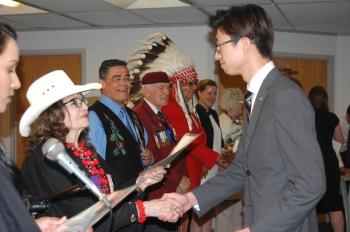Image Caption
By Shari Narine
Sweetgrass Contributing Editor
EDMONTON
June 21, 2016.
On National Aboriginal Day, Muriel Stanley Venne will lead 40 immigrants to Canada as they swear their allegiance to their new country.
This will mark the first time an Indigenous person has presided over a citizenship ceremony in Edmonton - and quite possibly, the first time in Alberta.
“I’m so thrilled. I’m honoured to be able to preside over this,” said Stanley Venne, who is Metis. “I am able to be the presiding official because I have the Order of Canada and I’m actually representing the Queen of England and Canada.”
Stanley Venne is the founder and president of the Institute for the Advancement of Aboriginal Women and co-chair of the Aboriginal Commission on Human Rights and Justice. She was named a member of the Order of Canada in 2005, just one of her many recognitions over the years.
Stanley Venne presiding over the citizenship ceremony is significant, says Lewis Cardinal, who co-chairs the ACHRJ.
“It’s placing Indigenous people at the forefront and saying we have a role in welcoming newcomers to Canada,” he said.
But today’s ceremony will go beyond welcoming.
Cardinal will talk about the philosophy and meaning of Canada from the Indigenous perspective as well as the gathering place that is at the foundation of Edmonton. Former Samson Cree Nation Chief Roy Louis will talk about the importance of treaty as well as the Truth and Reconciliation Commission. Elder Marggo Pariseau will deliver a traditional prayer. John K. Macdonald will represent the Aboriginal veterans. There will be First Nation drummers and Metis dancers.
“We’re sharing with them a little bit about who we are as Indigenous people, the history of Canada, what Canada rests on politically and structurally as a nation state. So I think those are very important messages that Indigenous people are not vestitures of the past. They’re an actual important part and a vital part of Canada today,” said Cardinal.
There is a divide between the immigrant community and the Indigenous community, says Stanley Venne.
“That’s the reason we’re doing it because they don’t understand,” she said.
Cardinal is quick to say that both immigrant organizations and Indigenous organizations share the blame for that lack of understanding.
“Our people have to reach out more in terms of creating opportunities to engage and share with each other,” he said. “Once we cross that bridge and visit each other … we learn we have a lot more in common and that way you create an understanding between the different nations.”
Cardinal says in his dealings with the African community, he has discovered that they have a reverence for their Elders and Mother Earth and a “deep philosophy of peace and peaceful and those are all very foundational elements to Indigenous people in Canada.”
Recently, the Edmonton Community Foundation provided Bent Arrow Traditional Healing Society with $12,000 to implement Miyo Wahkohtowin Gathering (Good Relations). The program brings together Syrian newcomers and Indigenous peoples, to share unique cultures and embrace differences and to build a foundation of understanding and acceptance.
More of this kind of work needs to be done, says Cardinal.
"National Aboriginal Day is first and foremost an occasion to celebrate the fundamental role First Nations, Métis, and Inuit have played – and continue to play – in shaping the identity of all Canadians. Coast to coast to coast, their remarkable art and cultures, significant contributions and history, are essential to our sense of nationhood,” said Prime Minister Justin Trudeau in a statement.
Today marks the 20th anniversary of National Aboriginal Day.

